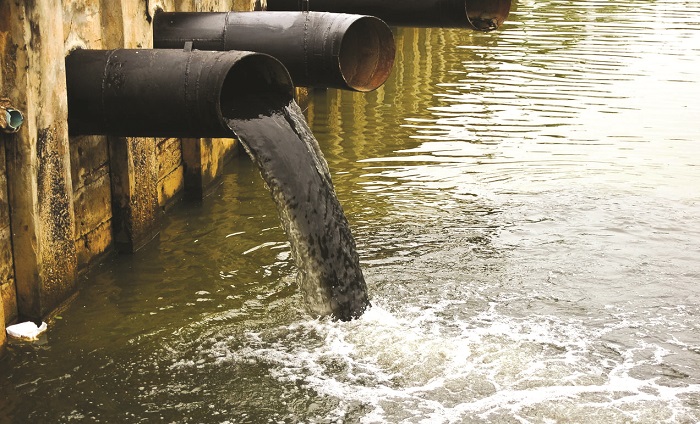Faeces in Sachet Water?
Our elders say that “when a serious matter is about to manifest itself, it does not arrive bearing a flag”.
In other words, no matter how serious the issue might be, it may creep into the public’s consciousness; slow, silent, hardly visible. Until, like a virus of the Covid-19 type, it strikes all at once – everywhere; multiple victims; sometimes incurable.
These fearsome thoughts entered my mind when I read a headline from The Chronicle newspaper, as quoted on the Internet, which asked bluntly: “S***t In Sachet Water? Consumers Mad Over GSS Report.”
According to the article, QUOTE: “Social media (Twitter) went haywire … following the banner story of The Chronicle captioned “Beware! The Sachet Water you consume May Contain S***t.” Ghanaians expressed mixed reactions over the health alert raised by the Ghana Statistical Service (GSS).
“Whilst others were utterly surprised over the development, others claimed to have been in the know. Others also described the headline by The Chronicle as ‘wild’. [One journalist was surprised that] ”the development had now come into the public domain”.
This menace (he said) was “not only linked to the sachet water industry, but public water systems, [which] had been contaminated”
Another person asked:: “So why do we pay [the] Standard Authority? And district assembly workers?” A third asked: “Y’all now realising?” He alleged that he “knew this faecal matter existence in Ghanaian sachet water five years ago”.
However, these questions seem to me minor, in relation to the problem of safe water in Ghana generally these days. The major issue is this: has galamsey not coarsened us to accept the pollution of the country’s water sources as inevitable? If big rivers like Ankobrah, Pra, Birem, Tanoh and Densu have turned chocolate-brown in colour, and have stayed dirty-coloured for years and years, what guarantee do we have that they and their tributaries bare safe to drink, irrespective of how much treatment is applied to them?”
The point is that it stands to reason to expect water production, in our current situation, top have become one of the most lucrative enterprises in the country. Whenever I travel out of Accra, I am always offered sachet water, but I stopped accepting it ever since I drank some about ten years ago and had a tummy upset that lasted over three weeks.
These days, I always carry beer with me whenever I travel. But, of course, I need water to take almost every medicine prescribed for me, so I am not safe, despite my caution. In any case, isn’t beer composed of about 75% water? And the “bottled” water I gladly use to take my medicine, isn’t it manufactured by the same water companies that produce sachet water?
As I pointed out at the beginning, serious issues creep up on us. Unless we take drastic steps to salvage our water sources and also police the manufacture of water by factories, we shall begin to fall ill “by heart” without knowing why.
Diseases carried by water include choleras (also known as “the dirty hands disease”); diarrhoea and dysentry. Diarrhoea, “though common and easy to treat in sanitary living conditions, can be deadly without medical care and clean water, since the rapid loss of fluids can lead to severe dehydration”
Next come Typhoid Fever, E- coli, Hepatitis A and · Salmonella.
According to Wikipedia, [https://en.wikipedia.org › wiki › Waterborne diseases] “waterborne diseases are conditions, 47 of which are caused by pathogenic micro-organisms that are transmitted in water. These diseases can also be spread while bathing.
Wikipedia specifies that “Water-borne diseases are the ones caused by pathogenic microbes spread via contaminated water. Transmission of these pathogens occurs while using infected water. “
Wikipedia adds: “Poor water quality becomes inevitable when water gets polluted with industrial waste, human waste, animal waste, garbage, untreated sewage, and chemical effluents”. In Ghana, the discharge of mercury and other chemicals into rivers whilst sand dredged from riverbeds/banks during galamsey operations, is the main cause of dangerous water pollution.
Government agencies attempt to conscientise galamsey operators to realise the danger their activities pose to the very communities whose economic welfare they claim to be trying to promote. They have used their political influence to persuade the Government that they can transform galamsey successfully into well-supervised “community mining programmes..
But, as the saying goes, “if you don’t know what death is really like, just look at sleep!”” It is these same persuasive and resourceful community “benefactors who clandestinely transport excavators and bulldozers to our rivers to ruthlessly churn the riverbeds over and make the rivers dangerous to man and best. It is also they who bribe the police and local authorities to close their eyes to the illegal transportation of galamsey equipment like changfans, as well as the illegal importation of Chinese technicians who are well versed in gold-winning activities.
It is a matter of gold or our lives — Literally. For “money sweet”. I mean gold so intoxicated King Midas (in the Aesop story) that he asked to be empowered to “turn everything he turned into gold”. Meanwhile, he’d forgotten that food has to be touched before it can be eaten. His greed led him to an early grave, of course.
Similarly, the influential politicians who are using all sorts of arguments to enable them to carry out disguised forms of galamsey, will find themselves dead and their ill-gotten gains turned into subjects of public ridicule.
The only trouble is that they will probably take a lot of innocent people with them!
Madness, thy name is galamsey!



